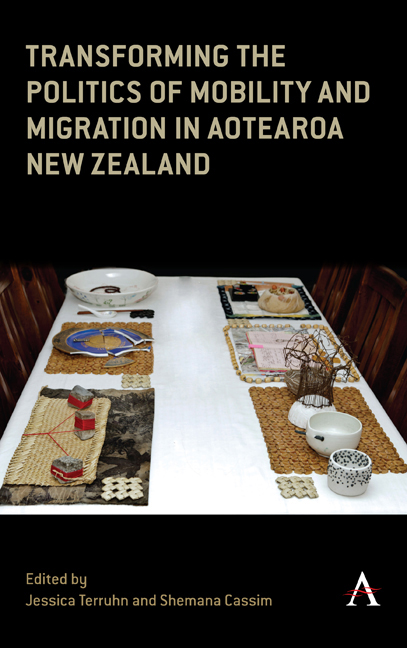Book contents
- Frontmatter
- Contents
- Acknowledgements
- Contributors
- Glossary of Te Reo Māori Words
- Glossary of Te Reo Māori Place Names
- Glossary of Other Non-English Words
- List of Tables
- List of Figures
- Introduction: Reimagining the Politics of Mobility and Migration Through Decolonisation, Social Justice and Solidarities
- Cover Artwork: A Place at the Kauri Table Revisited … 2021
- Part One Decolonising the Politics of Migration
- Part Two Humanising the Politics of Transnational Mobility
- Part Three Building Solidarities for Migrant Rights and Belonging
- Conclusion: Towards Transforming the Politics of Mobility and Migration in Aotearoa New Zealand
- Index
Conclusion: Towards Transforming the Politics of Mobility and Migration in Aotearoa New Zealand
Published online by Cambridge University Press: 28 February 2024
- Frontmatter
- Contents
- Acknowledgements
- Contributors
- Glossary of Te Reo Māori Words
- Glossary of Te Reo Māori Place Names
- Glossary of Other Non-English Words
- List of Tables
- List of Figures
- Introduction: Reimagining the Politics of Mobility and Migration Through Decolonisation, Social Justice and Solidarities
- Cover Artwork: A Place at the Kauri Table Revisited … 2021
- Part One Decolonising the Politics of Migration
- Part Two Humanising the Politics of Transnational Mobility
- Part Three Building Solidarities for Migrant Rights and Belonging
- Conclusion: Towards Transforming the Politics of Mobility and Migration in Aotearoa New Zealand
- Index
Summary
A Decolonising Lens to Migration
Current events around the globe, such as the Covid-19 pandemic and the Black Lives Matter and #MeToo movements, have all played a part in shining a spotlight on global struggles for social and racial justice. Locally, in Aotearoa New Zealand (hereafter, Aotearoa), recent events such as the Ōtautahi Christchurch mosque attacks and the Migrant Lives Matter movement have echoed these sentiments. Such events overall have also highlighted the pre-existing issues of differential inclusion, exclusion and precarity faced by migrant communities in host nations.
Aotearoa, in particular, is a nation built on migration, beginning with the arrival of Māori, through to the arrival of and colonisation by European settlers, and continuing on to the contemporary immigration of multi-ethnic communities from across the globe (Wynyard, Chapter One). Over time, these arrivals have shaped the landscape of migration in Aotearoa, where today, the politics of migration involve a legacy of settler colonialism comprising unequal attributions of privilege and the resultant minoritisation of certain groups (Collins, Chapter Two; Kaloti, Commentary, Part Two; Terruhn, Chapter Three), alongside the outright erasure of tangata whenua (Indigenous people of the land) in migration-related decision making (Wynyard, Chapter One; Collins, Chapter Two).
Importantly, the current system disregards Te Tiriti o Waitangi (The Treaty of Waitangi) as the founding document of Aotearoa, and undermines Māori self-determination as equal Tiriti partners. A decolonising lens to migration forces us to uphold and legitimise Te Tiriti o Waitangi as the nation's founding document, and pertinently, as the nation's first migration policy document, where Māori are actively involved in immigration decision making as equal Tiriti partners (Kukutai and Rata 2017). A Tiriti-based approach to migration, then, also concedes that the state needs to work in genuine partnership with Māori to develop such an approach.
A number of government departments in Aotearoa have articulated their commitment to Te Tiriti through various policies, plans and strategies, yet leading Māori scholars point out that these initiatives are often merely symbolic gestures (Kukutai et al. 2021). Rather, a Tiriti-based approach to migration in Aotearoa should move beyond symbolism, to actively develop and operationalise a transformed politics of migration alongside Māori. Such an approach further allows the state (including both Māori and the Crown) to act as true ‘hosts’ who welcome immigrants as ‘guests’ onto this whenua (land) through values such as manaakitanga (host responsibility, care, kindness) and whakawhanaungatanga (relationship building).
- Type
- Chapter
- Information
- Publisher: Anthem PressPrint publication year: 2023

